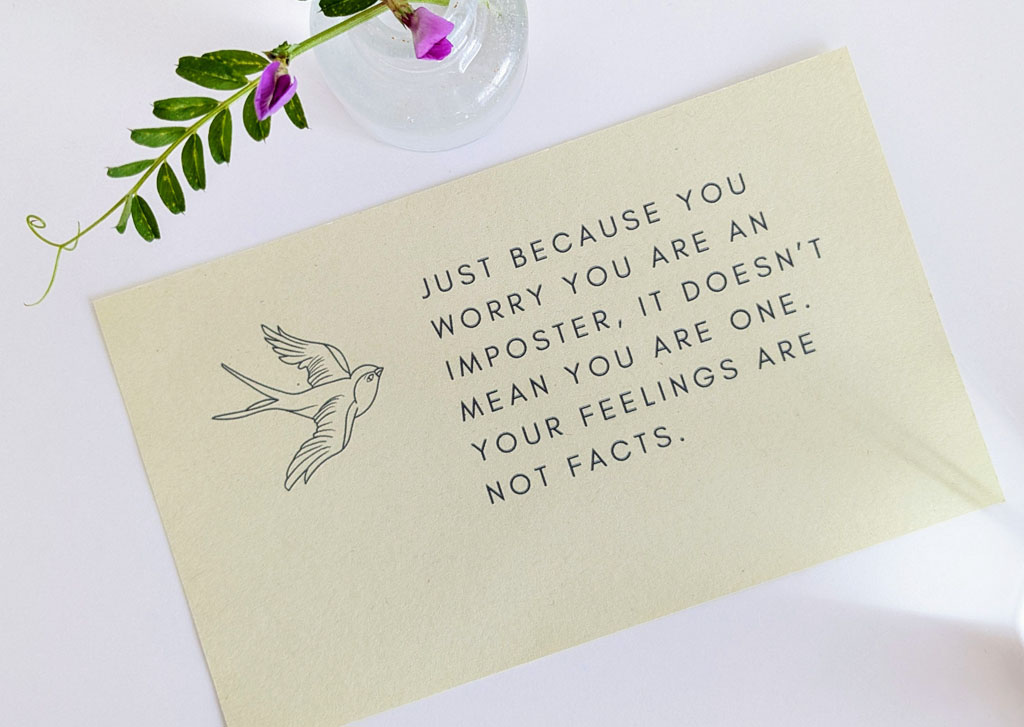Feelings are important and I’m all for trusting them. I wouldn’t be much of a psychologist if I told you otherwise! Emotions guide your beliefs and the meaning you give to things in life. They provide us with information and communicate our inner worlds to others – they are an indicator to us of what’s going on, they help us process information and they act as a warning signal when we’re not feeling so good. Guilt helps us right a wrong; grief allows us to get over a loss; love brings us closer to others. Emotions are an essential part of who we are and how we survive. But, and it’s a big but, they are not always accurate – and fear can be a particularly tricky emotion.
Unfortunately, imposter syndrome is all about fear.
Imposters fear being found out or not being good enough so strongly that they do not question their fear. If what you believe is true, then you’re right to be scared: being found out, failing, the humiliation that comes with what you imagine – these are terrifying.
But what if you’re not right? This is impossible for you to see when the fear response is so strong. It is shouting that you’re in danger so loudly, that you can’t see anything else. Add the rush of physical sensations this triggers – increased heart rate and breathing, tension and heat – and it’s almost impossible to look rationally at what’s going on. There’s no chance to look at all the information or carefully weigh things up and then decide what to do.
Feelings are not facts
What confuses the situation further is that our emotions are intrinsically linked to our thoughts and behaviour. Feelings can trigger certain thoughts and reactions just as certain actions and thoughts can trigger feelings. They are all connected. Our feelings colour our thoughts and shape them: feeling anxious might prompt you to fear you’re not up to the task, while thinking you’re not up to the task will prompt you to feel fear.
Fear puts an anxious filter on everything we do. I’m sure you’ve experienced this: on the days when you’re feeling good you glimpse how well you’re doing, but soon fear overrides the positives. Nothing dramatic has changed, but the feeling is different.
There’s a fine line between feelings and facts. Our feelings can trick us into believing that things are worse than they are, but feelings are only one piece of the puzzle. You need to use your thoughts and experience to see the full picture. It’s only when you put them all together that you can see clearly what’s going on.
Imagine you had a chance to interview people before they competed in a race. Would you predict that the person who felt most confident that they were going to win would in fact be the first to cross the finish line? If they looked you in the eye and said, ‘I feel really confident, I feel I’m definitely going to win,’ would you back them without any further questions?
I’d find their confidence convincing, but if they were basing their confidence only on a feeling, I wouldn’t trust them fully.
Personally, I’d want to know a bit more – how well they’ve prepared for this race, what their recent form has been like, how well they’ve been running, and what their coach thinks. I would want to know the facts, I’d want more evidence. I’m not going to back someone simply because they feel they will win.
Yet this is what you’re doing if you rely on your feelings as your most accurate source of information. When it comes to imposter syndrome you know you’re an imposter, but everyone else sees something different. You have a catalogue of achievements, but you don’t count them.
Your belief that you are an imposter is not based on evidence you can show someone – there are no huge muck-ups or epic fails – it’s based on a feeling. But just because you worry you are an imposter, it doesn’t mean you are one. Your feelings are not facts. You need to listen to your feelings, but do not treat them as more important than all other information. It’s important to use your head and your heart.
- This is an edited extract from The Imposter Cure by Dr Jessamy Hibberd (published by Octopus).

